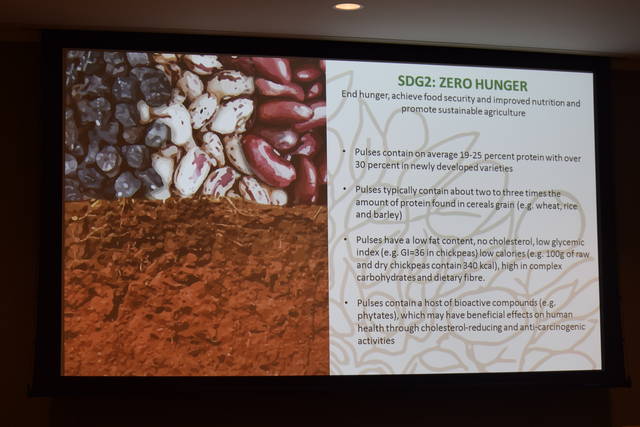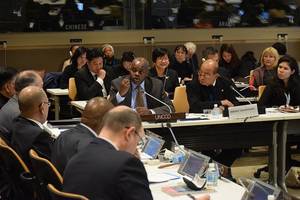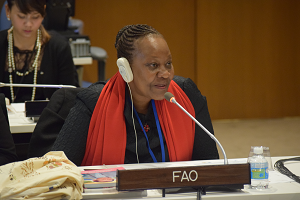New York - World Soil Day 2016 Celebrations

The contribution that pulses can give to food security, nutrition and sustainable development and the challenge posed by land degradation were highlighted at the World Soil Day celebration that took place on 2 December in New York. 
“Sustainable management systems and practices will unlock the full potential of soils to support food production, store and supply clean water, preserve biodiversity, sequester more carbon and increase resilience to a changing climate,” said the Secretary General of the United Nations, Mr. Ban Ki-moon, in a message read by Mr. Thomas Gass, UN DESA Assistant Secretary-General for Policy Coordination and Inter-Agency Affairs.
Pulses, also known as grain legumes, can boost soil health while supporting healthier and nutritious diets. Dry beans, peas, lentils and other pulses combine with soil in a unique symbiosis that protects the environment, enhances productivity, contributes to adapting to climate change and provides fundamental nutrients to the soil and subsequent crops. Pulses can fix atmospheric nitrogen in their roots. By freeing soil-bound phosphorous to make it accessible and usable by plants, pulses also reduce the need to apply external fertilizer. These are all drivers of sustainable development.

The internationally acclaimed Chef Ron Pickarski, founder of Eco-Cuisine and whose recipes feature on the FAO Publication “Pulses: nutritious seeds for a sustainable future”, made the case for bringing pulses to the center of the plate. He showed different examples of how pulses can provide a consistent source of protein and other important nutrients to the diet, while contributing to a more sustainable environment.
The World Soil Day celebration in New York was also the opportunity for the presentation of the FAO Publication “Soils and Pulses, a Symbiosis for life”.The book highlights the various contributions that pulses can make to healthy soils and, by consequence to climate change mitigation and to achieve several of the Sustainable Development Goals.
The event “Soils and pulses, a symbiosis for life and for halting soil degradation” was hosted by the Permanent Missions of Thailand, Lesotho and Turkey, in collaboration with the United Nations Convention to Combat Desertification (UNCCD) and the Food and Agriculture Organization of the United Nations (FAO), also paid tribute to His Majesty the late King Bhumibol Adulyadej of Thailand in recognition of his lifelong work on soils and sustainable soil management.“Soil is a vital endowment given by Mother Nature, from which we derived the essentials of life itself, and therefore lies at the heart of human survival”, said the Permanent Representative of Thailand to the United Nations, H.E. Ambassador Virachai Plasai, quoting the late Thai King.
Tackling soil degradation
The Permanent Representative of Lesotho to the United Nations, Ambassador Kelebone Maope, highlighted at the meeting the impact of soil degradation in Lesotho and stressed the importance of enhanced cooperation between government, communities, and international partners to tackle the issue.
enhanced cooperation between government, communities, and international partners to tackle the issue.
The Deputy Permanent Representative of Turkey to the United Nations, Mr. Güven Begeç, shared the accomplishments of the UNCCD COP12, which took place in Ankara in 2015. Among them, he highlighted the Ankara initiative, which joins the COP12 efforts to strengthen the implementation of both the UNCCD and the Sustainable Development Goals.
Mr. Melchiade Bukuru, Chief of the UNCCD office in New York underscored the key role of going land degradation neutral in addressing pressing challenges, such as food insecurity, poverty eradication and climate change.the key role of going land degradation neutral in addressing pressing challenges, such as food insecurity, poverty eradication and climate change.
The Director of the FAO Liaison Office to the United Nations, Ms. Carla Mucavi, stressed that it was more expensive to restore highly degraded soils than to adopt improved land managemnt practices that guarantees their health.

